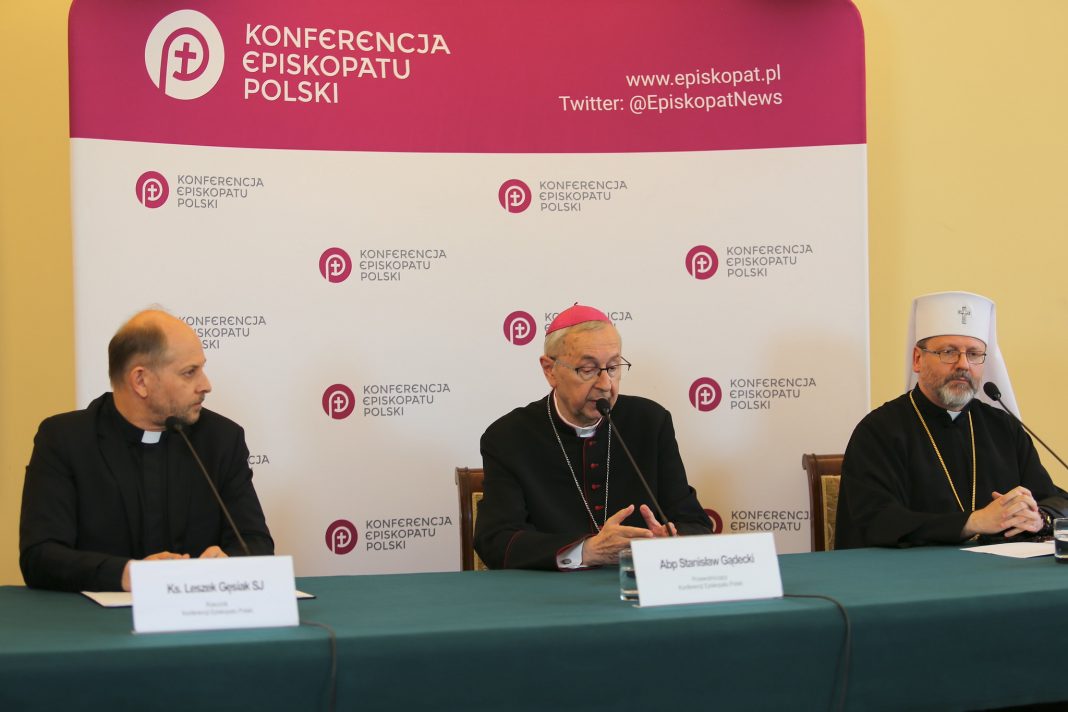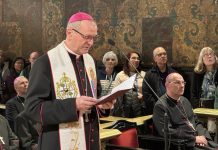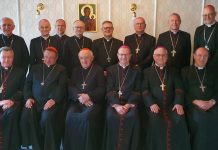Polish-Ukrainian reconciliation is a long process. It starts with what we call a longing for truth, said Archbishop Stanisław Gądecki, President of the Polish Bishops’ Conference, during a press conference taking place in the House of the Archbishops of Warsaw after the Service of “Forgiveness and Reconciliation”.
The President of the Polish Bishops’ Conference admitted that Polish-Ukrainian reconciliation is a long process: “It all began more than 20 years ago with the meetings held by cardinals from Poland and Ukraine in Rome, hoping that it would be possible to overcome the animosities that existed and that were felt by either side”.
Archbishop Gądecki indicated that the process of reconciliation starts with what we call a longing for truth, i.e. “the recognition of the real history, which we can grasp through historical research, and which usually calls for a prolonged recognition”.
“The 80 years of reflection has shown how hard it is to resolve issues that are painful on both sides”, observed Archbishop Gądecki. He stressed that the most pressing issue in Polish-Ukrainian relations “is solely a matter of commemorating those graves, the people who died; their families would like to meet at their graves and pray”.
Major Archbishop of Kyiv-Halyč Sviatoslav Shevchuk, head of the Ukrainian Greek Catholic Church, observed that the solemn reconciliation through prayer that occurred in Warsaw was “a very powerful moment which will speak to the hearts of both Ukrainians and Poles. Regrettably, the wounds and resentments we have incurred in mutual confrontation continue to ache. Therefore, it will also be symbolic that together with His Excellency Archbishop Gądecki, we will travel together from Warsaw to Lutsk. In this way we will connect Poland and Ukraine. We will create a bridge between Warsaw and Lutsk, between Mazovia and Volhynia, where a similar commemoration will take place on the Ukrainian side. For me, this is really a very strong spiritual experience, and I can feel emotion in my heart”.
Archbishop Shevchuk urged for the study of the past and history as there is no true reconciliation without the recognition of truth. “I do not mean only the truth of facts but also the truth of the root causes, seeking answers to how and why it all happened. We must learn the truth not in order to settle old scores but to avert the possibility of the recurrence of what has happened”, he added. Archbishop Shevchuk admitted that “seeking the truth is vital to the purification of memory. For us Christians, knowledge of the truth is a process of healing, a process of purification and a process of conversion. We are not afraid of the truth. My predecessors have already said that even when one Ukrainian has committed a crime against a Pole, we should repent for it before God. The same applies to the Polish side; even when only one Pole has wronged a Ukrainian, he too should feel that he must stand before the Lord and ask for forgiveness. This is something normal. This is our Christian way of life. We are not angels, but human beings of flesh and blood, and we must accept this”.
Archbishop Shevchuk indicated: “We cannot consent to never-ending tearing at our historical wounds and aggravating our pain. Wise citizens understand that where tensions arise, friendship must be fostered. If we realise this – on both the Ukrainian and the Polish side – we will not allow our historical pain to be instrumentalised. We must forge social relations on the principles which will make all of us better and which build a state with solid foundations”.
Press Office of the Polish Bishops’ Conference
Translated by M. Turski / Office for Foreign Communication of the Polish Bishops’ Conference

 English
English






